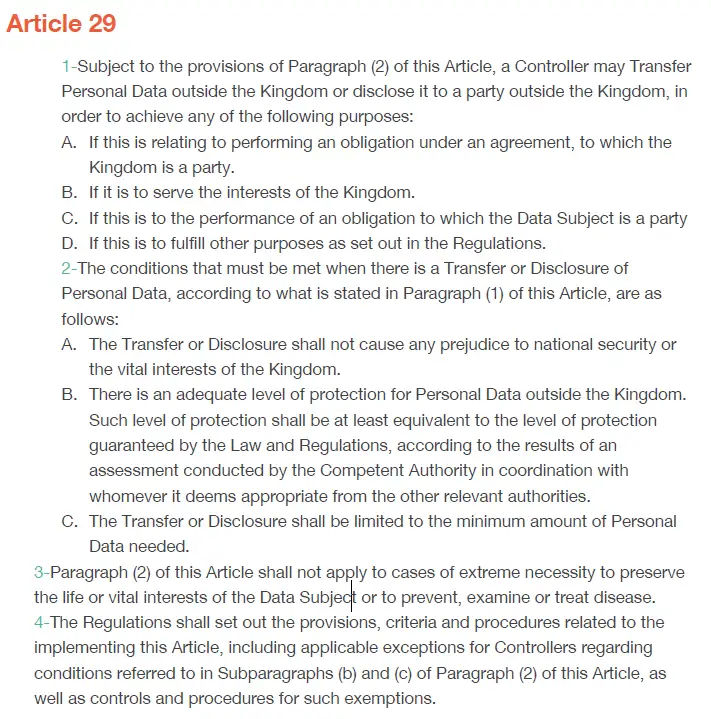
Abstract
This paper explores KSA PDPL – Article 29, which outlines the regulatory frameworks governing data transfers outside the Kingdom. The article discusses the obligations and responsibilities of controllers to ensure personal data is protected, national interests are safeguarded, and compliance requirements are met in cross-border data flows.
Keywords
Data transfer; personal data; data protection; national security; privacy laws; cross-border data flows; controllers; Kingdom regulations
Introduction Of KSA PDPL – Article 29
With the rapid growth of global data exchange, data privacy and protection have become increasingly critical. This paper provides an overview of the Kingdom’s viewpoint on data security and its regulatory measures under Article 29. This article emphasizes the importance of safeguarding national security while ensuring personal data protection and setting conditions for controllers in transferring data outside the Kingdom.
Explanation
Article 29 provides a regulatory framework for data transfer and disclosure outside the Kingdom. The article allows controllers to transfer or disclose data to fulfill contractual obligations, serve national interests, protect the data subject’s vital interests, and comply with other specified regulations. Conditions for these transfers include ensuring an adequate level of data protection and minimizing data transfer scope.
Detailed Discussion Of KSA PDPL – Article 29
Key Strategic Points
Article 29 aims to protect national security and personal data by requiring adequate levels of data protection when transferring data outside the Kingdom, and limiting data disclosure to essential information only.
General Activation Steps
Controllers must follow specific steps to ensure compliance, including assessing the need for data transfer, validating protection levels, and gaining necessary authorizations from regulatory authorities.
Enablement Methodology Of KSA PDPL – Article 29
Enablement methodologies include using data encryption, enforcing data minimization principles, and ensuring informed consent for data transfers.
Use Cases In KSA PDPL – Article 29
Typical cases for data transfer include fulfilling contractual obligations, protecting national interests, and preserving the data subject’s life or vital interests during emergencies.
Dependencies
Compliance with Article 29 depends on coordination with the Competent Authority and alignment with international data protection standards, ensuring equivalency in data security.
Tools/Technologies
Tools like data encryption, data masking, and third-party risk assessment platforms are essential in maintaining compliance.
Challenges & Risks Of KSA PDPL – Article 29
Challenges include risks related to cross-border data breaches, compliance enforcement, and establishing adequate levels of protection in diverse jurisdictions.
Conclusion
In summary, Article 29 establishes a critical framework for managing data transfers outside the Kingdom. It balances data protection with national security interests and offers clear guidance on the responsibilities of controllers in securing personal data. Controllers must adhere to regulatory guidelines and utilize suitable technologies to ensure compliance and safeguard data integrity in cross-border transfers.
References
- Saudi Data and Artificial Intelligence Authority. (2023).
- KSA PDPL – Kingdom of Saudi Arabia Personal Data Protection Law.
Recommended Resources
- Big Data vs. Traditional Data, Data Warehousing, AI, and Beyond
- Big Data Security, Privacy, and Protection, & Addressing the Challenges of Big Data
- Designing Big Data Infrastructure and Modeling
- Leveraging Big Data through NoSQL Databases
- Data Strategy vs. Data Platform Strategy
- ABAC – Attribute-Based Access Control
- Consequences of Personal Data Breaches
- KSA PDPL (Personal Data Protection Law) – Initial Framework
- KSA PDPL – Consent Not Mandatory
- KSA PDPL Article 4, 5, 6, 7, 8, 9, 10, 11, & 12
- KSA PDPL Article 13, 14, 15, 16, 17, 18, 19, 20, 21, 22, 23, 24, 25, 26, 27, & 28
- KSA NDMO – Data Catalog and Metadata
- KSA NDMO – Personal Data Protection – Initial Assessment
- KSA NDMO – DG Artifacts Control – Data Management Issue Tracking Register
- KSA NDMO – Personal Data Protection – PDP Plan, & PDP Training, Data Breach Notification
- KSA NDMO – Classification Process, Data Breach Management, & Data Subject Rights
- KSA NDMO – Privacy Notice and Consent Management
- Enterprise Architecture Governance & TOGAF – Components
- Enterprise Architecture & Architecture Framework
- TOGAF – ADM (Architecture Development Method) vs. Enterprise Continuum
- TOGAF – Architecture Content Framework
- TOGAF – ADM Features & Phases
- Data Security Standards
- Data Steward – Stewardship Activities
- Data Modeling – Metrics and Checklist
- How to Measure the Value of Data
- What is Content and Content Management?

